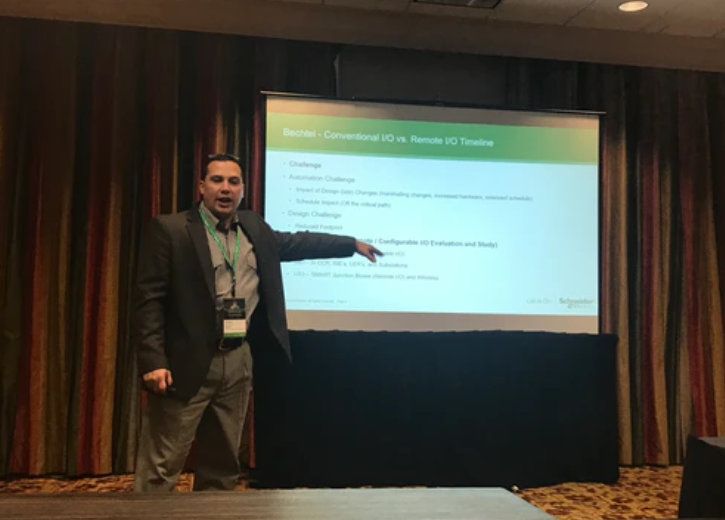 Robert Resendez, control and automation team manager at Bechtel Oil, Gas, & Chemicals
Robert Resendez, control and automation team manager at Bechtel Oil, Gas, & Chemicals
Schneider Electric revealed the newest generation of its intelligent enclosures for EcoStruxure Triconex safety and EcoStruxure Foxboro distributed control systems (DCSs) at Innovation Days 2019, the company’s user group meeting for Foxboro and Triconex technology users.
Designed for oil and gas, petrochemical, chemical, and other high-hazard industrial enterprises, the new pre-engineered, pre-tested enclosures are said to speed project execution and decrease start-up costs by providing an out-of-the-box offering that users can purchase and easily set-up in the field.
“Today, you can buy the intelligent enclosure as a single part number with I/O density already defined,” said Robert Resendez, control and automation team manager at Bechtel Oil, Gas, & Chemicals, during a session on the benefits and savings experienced while implementing the intelligent enclosures at Bechtel plants. “We’re not having to custom engineer every single control cabinet and every single marshalling cabinet. We can buy what they make and use it right off of the shelf.”
This new intelligent enclosure line includes:
· EcoStruxure Triconex safety field mounted intelligent enclosure and Foxboro DCS field mounted intelligent enclosure, both designed for use outdoors (including hazardous areas) for distribution of I/O where and when required.
· EcoStruxure Foxboro DCS equipment room intelligent enclosure, designed to be installed in air-conditioned non-hazardous equipment room environments.
Each enclosure is packaged with universal I/O modules with adaptive field termination panels to reduce the number of wiring connections. Choice of redundant power supply voltages, cabinet documentation, and standard installation and commission guides are also available. With these features, Schneider Electric says cabinet engineering design and documentation time is reduced by 25%, project schedules are reduced by 30%, traditional cabinet marshalling is reduced between 30-50%, and less time is spent on the engineering, review, and approval cycles.
The intelligent design also extends to commissioning—with the enclosures and associated programming managed and tested in the factory, commissioning cycle time is shortened. Because Schneider Electric’s engineering program decouples hardware from software, the company says this removes the need for full staging and Factory Acceptance Tests (FAT).
“Conventional FAT has gone out the window, saving time and space. There’s no need to line up those boxes in a warehouse and start doing a traditional FAT,” said Resendez in reference to projects done by Bechtel Oil, Gas, and Chemicals. “They’ve already did the FAT internally. This eliminated what we feel is an unnecessary step, saving a lot of time and effort.”
Schedule risks are lowered because process data can be used earlier. Industrial engineers can leverage best practice rules, templates, and virtual engineering and testing for decreased design errors and increased operational readiness.